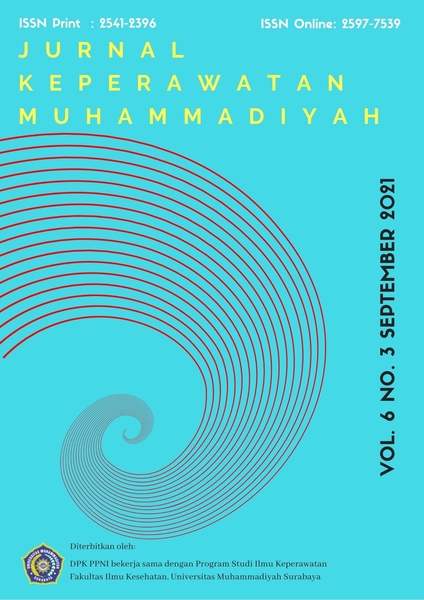Praktik Pemberian Asi Eksklusif Pekerja Wanita Di Universitas Muhammadiyah Surabaya
DOI:
https://doi.org/10.30651/jkm.v6i3.11470Keywords:
Exclusive Breastfeeding, Female WorkersAbstract
Objective: Â aims to describe the practice of exclusive breastfeeding for female workers at the University of Muhammadiyah Surabaya.
Methods: The research design is descriptive quantitative, the sampling technique is total sampling. The research sample was female workers at the University of Muhammadiyah Surabaya who breastfeed babies aged 6-12 months as many as 22 people. Data collection in October-April 2020 using a questionnaire and structured interview guidelines with Google Form. The data results are presented in the form of a frequency distribution table.
Results: . The results showed that from 22 respondents, there were 13 respondents (59.1%) who succeeded in giving exclusive breastfeeding, 9 respondents (40.9%). The practice of exclusive breastfeeding of female workers at the Muhammadiyah University of Surabaya is more successful and there are still some that are not. Conclusion: Â The success of exclusive breastfeeding is supported by the management of breastfeeding from the start of the leave period and when work is done well, besides that, most of the support from co-workers is very good. Although there is no dedicated room for expressing breast milk at work, most of the respondents have expressed breast milk regularly on average 3-4 times per day with a more flexible time.References
Caitom, Chintya D., A.A. Rumayar, dan A.A.T. Tucunan. 2019. Hubungan Pengetahuan dan Sikap dengan Pemberian ASI Eksklusif di Wilayah Kerja Puskesmas Sario Kota Manado. Kesmas. Vol 8. No 7. Universitas Sam Ratulangi. Manado.
Chowdhury, R., B. Sinha, M. J., M. J., Sankar, S., Taneja, N., Bhandari, N., Rollins, R., Bahl, dan J. Martines. 2015. Breastfeeding and Maternal Health Outcomes: a systematic review and meta-analysis. Acta Paediatrica. Volume 104. Issue S467. https://doi.org/10.1111/apa.13102
Derry, E J D., A K., Laar. 2016. Exclusive Breastfeeding among City-Dwelling Professional Working Mothers in Ghana. International Breastfeeding Journal. BMC
Juliani, Sri dan Arma Nuviah. 2018. Hubungan Pengetahuan, Sikap, dan Dukungan Tenaga Kesehatan dengan Keberhasilan ASI Eksklusif Di Wilayah Kerja Puskesmas Darussalam Kecamatan Medan Petisah. Jurnal Bidan Komunitas. Vol 1, No. 3
Kementrian Kesehatan RI. 2018. Hasil Utama Riskesdas 2018. Badan Penelitian dan Pengembangan Kesehatan.
Kementrian Pemberdayaan Perempuan dan Perlindungan Anak. 2018. Profil Perempuan Indonesia 2018. Kementrian Pemberdayaan Perempuan dan Perlindungan Anak
Kramer, M.S., R. Kakuma, 2012. Optimal Duration of Exclusive Breastfeeding. Cochrane Systematic Review. https://doi.org/10.1002/14651858.CD003517.pub2
Khayati, F. N.& Sulistiyowati D., 2019, Penggunaan Pompa Air Susu Ibu (ASI) Elektrik Oleh Ibu Bekerja, Jurnal SMART Kebidanan, Vol. 6 (2): 87-92.
Lestari, Pratiwi Puji. 2020. Review: Implementasi Baby Friendly Hospital Initiative (Inisasi Rumah Sakit sayang Ibu) dan Keberhasilan Menyusui Eksklusif. Jakiyah: Jurnal ilmiah Umum dan Kesehatan Aisyiyah. Vol 5 No. 1
Novayelinda, R. 2012. Telaah Literatur: Pemberian ASI dan Ibu Bekerja. Jurnal Ners Indonesia. Vol.2. No.2: hal (177–184)
Oktora R. ( 2013), Gambaran Pemberian ASI Eksklusif Pada Ibu Bekerja Di Desa Serua Indah, Kecamatan Jombang, Tangeran Selatan, Jurnal Kesehatan Reproduksi, Vol.4 No.1: hal (30-40).
Pemerintah Republik Indonesia. 2012. Pemerintah Pemerintah Nomor 33 tahun 2012 tentang Pemberian Air Susu Ibu Eksklusif. Jakarta: Presiden Republik Indonesia.
Pusat Kesehatan Kerja Depkes RI, 2011, Kebijakan Departemen Kesehatan Tentang Peningkatan Pemberian Air Susu Ibu (ASI) Pekerja Wanita. http://kebijakankesehatanindonesia.net/sites/default/files/file/kia/mei2/regul asi_terkait/kebijakan depkes ttg pemberian asi.pdf. di akses 11 April 2014
Ramadani, Mery. 2017. Dukungan Keluarga sebagai Faktor Dominan Keberhasilan Menyusui Eksklusif. Jurnal MKMI. Vol .13. No1
Rahmawati A., Prayogi B., 2017, Analisis Faktor Yang Mempengaruhi Produksi Air Susu Ibu (ASI) Pada Ibu Menyusui Yang Bekerja, Jurnal Ners dan Kebidanan, Vol.4 No.2: hal (134-140)
Sari, P.N., 2015, Meningkatkan Kesuksesan Program ASI Eksklusif Pada Ibu Bekerja Sebagai Upaya Pencapaian MDGs, Jurnal Kesehatan Masyarakat Andalas, Vol. 9. No.2: hal (93-97)
Setegn, T., Gerbaba, M., Deribe, K.. 2012. Faktor associated with exclusive breastfeeding practices among mothers in Goba District, south east Ethiopia: a cross-sectional study. http://www.ebscohost.com.
Subur, Widiyanto. 2012. Hubungan Pendidikan dan Pengetahuan Ibu tentang ASI Eksklusif dengan Sikap Terhadap Pemberian ASI Eksklusif. Thesis. Universitas Muhammadiyah Semarang.
Suliasih, R.A., dkk., (2019), Faktor Yang Berhubungan Dengan Keberhasilan ASI Eksklusif, Jurnal Sari Pediatri, Vo. 20 No.6: hal (375-381)
Tauriska, T.A., & F.Umamah. 2015. Hubungan Antara Isapan Bayi Dengan Produksi Asi Pada Ibu Menyusui Di Rumah Sakit Islam Jemursari Surabaya. Journal of Health Sciences. 8(1):15-20
WHO. 2015. Postnatal Care for Mothers and Newborns Highlights from the World Health Organization 2013 Guidelines.
Downloads
Published
Issue
Section
License
- Penulis tetap memegang hak atas karyanya dan memberikan hak publikasi pertama kepada jurnal ini yang secara simultan karya tersebut dilisensikan di bawah:Â Creative Commons Attribution-ShareAlike 4.0 International (CC BY-SA 4.0)













